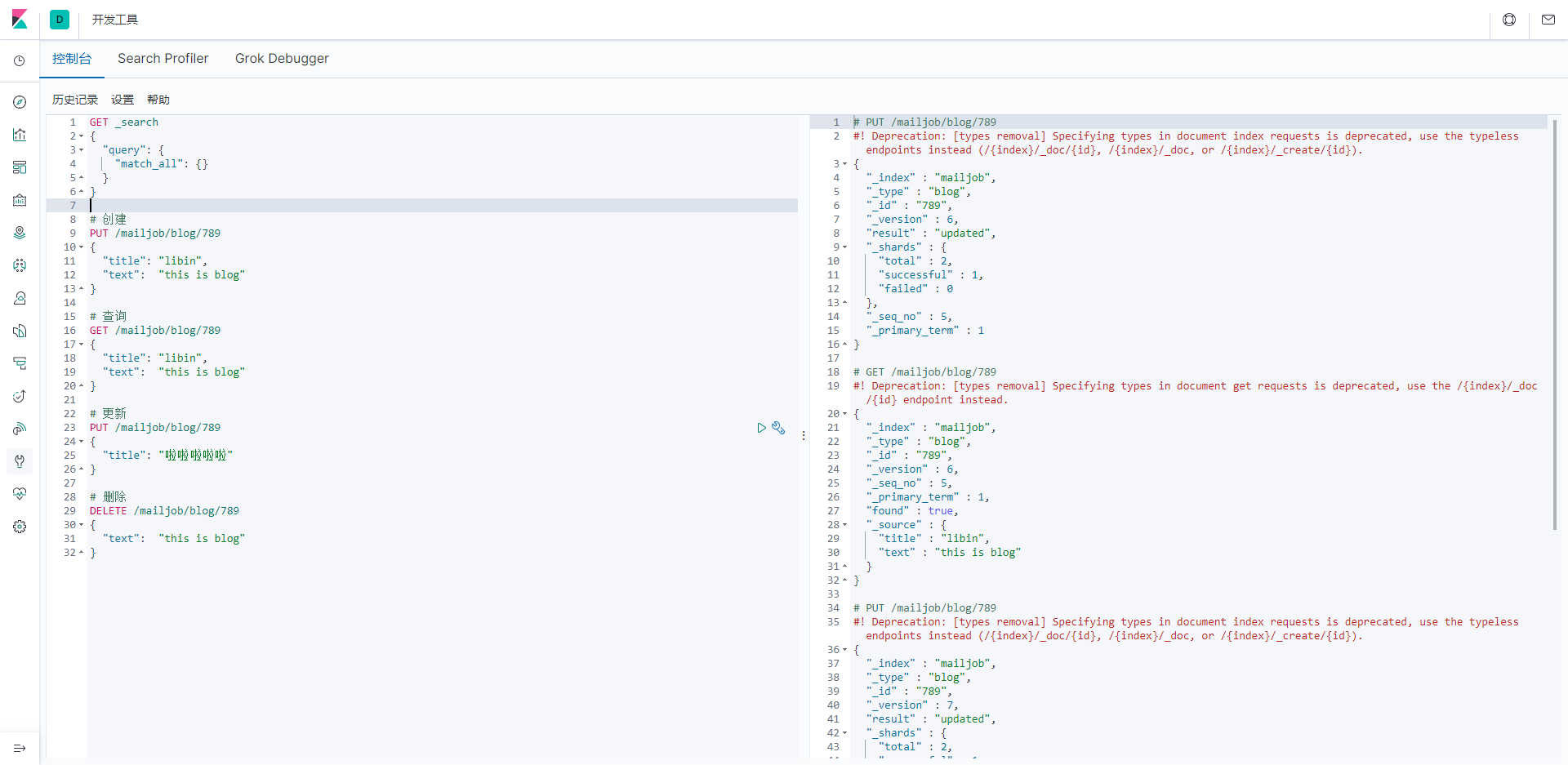前言
本文中,对于 Elasticsearch、kibana、Elasticsearch-head的基本使用,做一个演示
参考文献
ES官方文档:https://www.elastic.co/guide/cn/elasticsearch/guide/current/index-doc.html
| DB | Elasticsearch |
|---|---|
| 数据库(database) | 索引(indices) |
| 表(tables) | 类型(types) |
| 行(rows) | 文档(documents) |
| 字段(columns) | 字段(fields) |
CURD预览
| 示例名称 | 请求类型 | 路由 |
|---|---|---|
| 新建索引 | PUT | /{index}/{type}/{id} |
| 查询索引 | GET | /{index}/{type}/{id} |
| 更新索引 | POST | /{index}/{type}/{id} |
| 删除索引 | DELETE | /{index}/{type}/{id} |
路由
一个文档的 _index 、 _type 和 _id 唯一标识一个文档。 我们可以提供自定义的 _id 值,或者让 index API 自动生成。举个例子,如果我们的索引称为 website ,类型称为 blog ,并且选择 123 作为 ID ,那么索引请求应该是下面这样:
PUT /website/blog/123
{
"title": "My first blog entry",
"text": "Just trying this out...",
"date": "2014/01/01"
}kibana使用
# 创建
PUT /mailjob/blog/789
{
"title": "libin",
"text": "this is blog"
}
# 查询
GET /mailjob/blog/789
{
"title": "libin",
"text": "this is blog"
}
# 更新
PUT /mailjob/blog/789
{
"title": "啦啦啦啦啦"
}
# 删除
DELETE /mailjob/blog/789
{
"text": "this is blog"
}
Elasticsearch-head使用

Elasticsearch在linux使用
查询
[root@VM-0-15-centos home]# curl -X GET 'http://127.0.0.1:9200/mailjob/blog/789'
{"_index":"mailjob","_type":"blog","_id":"789","_version":1,"_seq_no":8,"_primary_term":1,"found":true,"_source":{
"title": "libin",
"text": "this is blog"
}更新
[root@VM-0-15-centos home]# curl -H 'Content-Type: application/json' -X POST 'http://127.0.0.1:9200/mailjob/blog/789' -d'{"title": "libin"}'
{"_index":"mailjob","_type":"blog","_id":"789","_version":2,"result":"updated","_shards":{"total":2,"successful":1,"failed":0},"_seq_no":9,"_primary_term":1}ik分词器测试
IK提供了两个分词算法:ik_smart 和 ik_max_word,其中 ik_smart 为最少切分,ik_max_word为最细 粒度划分
GET _analyze
{
"analyzer" : "standard",
"text" : "es插件来了"
}
{
"tokens" : [
{
"token" : "es",
"start_offset" : 0,
"end_offset" : 2,
"type" : "<ALPHANUM>",
"position" : 0
},
{
"token" : "插",
"start_offset" : 2,
"end_offset" : 3,
"type" : "<IDEOGRAPHIC>",
"position" : 1
},
{
"token" : "件",
"start_offset" : 3,
"end_offset" : 4,
"type" : "<IDEOGRAPHIC>",
"position" : 2
},
{
"token" : "来",
"start_offset" : 4,
"end_offset" : 5,
"type" : "<IDEOGRAPHIC>",
"position" : 3
},
{
"token" : "了",
"start_offset" : 5,
"end_offset" : 6,
"type" : "<IDEOGRAPHIC>",
"position" : 4
}
]
}
GET _analyze
{
"analyzer" : "ik_smart",
"text" : "es插件来了"
}
{
"tokens" : [
{
"token" : "es",
"start_offset" : 0,
"end_offset" : 2,
"type" : "ENGLISH",
"position" : 0
},
{
"token" : "插件",
"start_offset" : 2,
"end_offset" : 4,
"type" : "CN_WORD",
"position" : 1
},
{
"token" : "来了",
"start_offset" : 4,
"end_offset" : 6,
"type" : "CN_WORD",
"position" : 2
}
]
}
GET _analyze
{
"analyzer" : "ik_max_word",
"text" : "es插件来了"
}
{
"tokens" : [
{
"token" : "es",
"start_offset" : 0,
"end_offset" : 2,
"type" : "ENGLISH",
"position" : 0
},
{
"token" : "插件",
"start_offset" : 2,
"end_offset" : 4,
"type" : "CN_WORD",
"position" : 1
},
{
"token" : "来了",
"start_offset" : 4,
"end_offset" : 6,
"type" : "CN_WORD",
"position" : 2
}
]
}